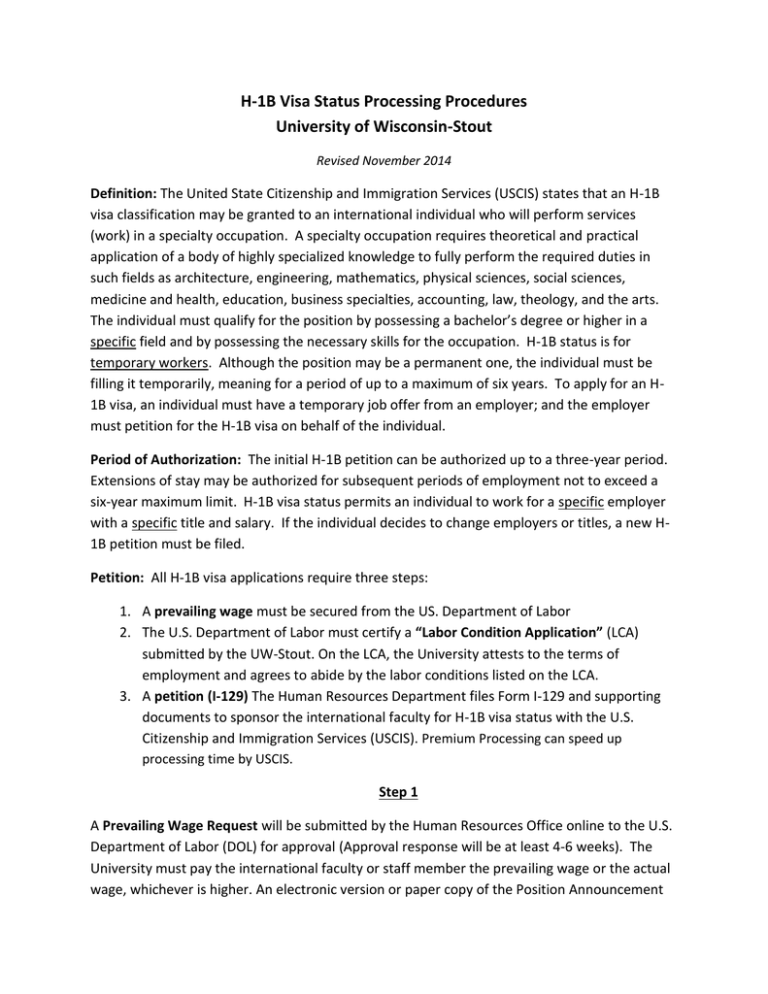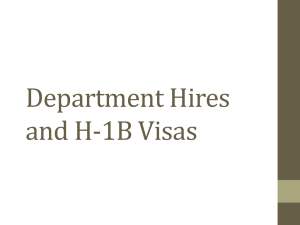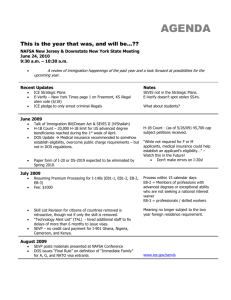H-1B Visa Status Processing Procedures University of Wisconsin-Stout
advertisement

H-1B Visa Status Processing Procedures University of Wisconsin-Stout Revised November 2014 Definition: The United State Citizenship and Immigration Services (USCIS) states that an H-1B visa classification may be granted to an international individual who will perform services (work) in a specialty occupation. A specialty occupation requires theoretical and practical application of a body of highly specialized knowledge to fully perform the required duties in such fields as architecture, engineering, mathematics, physical sciences, social sciences, medicine and health, education, business specialties, accounting, law, theology, and the arts. The individual must qualify for the position by possessing a bachelor’s degree or higher in a specific field and by possessing the necessary skills for the occupation. H-1B status is for temporary workers. Although the position may be a permanent one, the individual must be filling it temporarily, meaning for a period of up to a maximum of six years. To apply for an H1B visa, an individual must have a temporary job offer from an employer; and the employer must petition for the H-1B visa on behalf of the individual. Period of Authorization: The initial H-1B petition can be authorized up to a three-year period. Extensions of stay may be authorized for subsequent periods of employment not to exceed a six-year maximum limit. H-1B visa status permits an individual to work for a specific employer with a specific title and salary. If the individual decides to change employers or titles, a new H1B petition must be filed. Petition: All H-1B visa applications require three steps: 1. A prevailing wage must be secured from the US. Department of Labor 2. The U.S. Department of Labor must certify a “Labor Condition Application” (LCA) submitted by the UW-Stout. On the LCA, the University attests to the terms of employment and agrees to abide by the labor conditions listed on the LCA. 3. A petition (I-129) The Human Resources Department files Form I-129 and supporting documents to sponsor the international faculty for H-1B visa status with the U.S. Citizenship and Immigration Services (USCIS). Premium Processing can speed up processing time by USCIS. Step 1 A Prevailing Wage Request will be submitted by the Human Resources Office online to the U.S. Department of Labor (DOL) for approval (Approval response will be at least 4-6 weeks). The University must pay the international faculty or staff member the prevailing wage or the actual wage, whichever is higher. An electronic version or paper copy of the Position Announcement used during the recruitment for the international faculty or staff member will need to be sent to Cally Henderson in Human Resources prior to submitting the Prevailing Wage Request as information from that announcement is used for the request. Step 2 After the Prevailing Wage approval is received, a Labor Condition Application (form ETA 9035E) is required. Regulations from the DOL require the employer submit a Labor Condition Application – ETA 9035E (LCA) to the Regional DOL office. The hiring authority who signs the LCA certifies that following under penalty of perjury: the H-1B employee will be paid either the actual wage or the prevailing wage for the occupation, whichever is higher. The sponsoring Department will pay a similar wage to all employees with similar experience and qualifications; employing the international faculty/staff member will not adversely affect the working conditions of similarly employed workers (i.e. same benefits, annual increases are provided to all employees, etc.); on the date of the application, there is not a strike, lockout or work stoppage; and the employer will post notice of the Labor Condition Application (LCA) in a conspicuous location for at least ten business days (or provide it to the collective bargaining representative, if applicable). The Human Resources office will complete the LCA online and will, get the Department Chair’s signature on the approved form (Approval takes one week). The Human Resources Office will then email the department chair about the specific posting requirements. Step 3 The U.S. Citizenship and Immigration Services (USCIS) will determine whether the position is a “specialty occupation” and whether the individual meets the qualifications for H-1B status. The Human Resources Office will complete and submit form (I-129), “Petition for a Nonimmigrant Worker” along with supporting documentation to the USCIS. The hiring authority (Department Chair) must sign in three areas on the Form I-129 which: verifies the information is correct under penalty of perjury, agrees to comply with the terms of the approved LCA, and agrees to pay for return transportation of the international faculty or staff member abroad if he/she is dismissed from employment before the H-1B visa status expires. Fees: The Human Resource Office will request the following checks that will be submitted along with form I-129 to USCIS: A check in the amount of $325 made payable to the U.S. Citizenship and Immigration Services (do not abbreviate) and A separate check in the amount of $500 (Fraud Prevention and Detection Fee) made payable to the U.S. Citizenship and Immigration Services (do not abbreviate). This must be submitted with all initial and portability H1B petitions. Premium Processing = $1,225.00 When the H-1B is received by USCIS for processing, a Notice of Action, Form I-797C, is sent as confirmation. If the H-1B visa classification is approved, an approval notice, Form I-797A, is sent indicating the dates of the work authorization. The individual may not begin legal employment until the petition has been approved by USCIS. The bottom portion of Form I-797A is detached and given to the individual for him/her to retain with his/her previous Form I-94 departure record. The I-797A for the approval of the H-4 status for alien’s dependents, if any, is sent by USCIS directly to the address given on the I-539 form. Dependents The spouse and unmarried children under age 21 of an individual on an H-1B visa may apply for an "H-4 dependent" visa. Family members in the U.S. who wish to change to H-4 status from another status or to extend their current H-4 status, must complete a US Citizenship and Immigration Services (USCIS) Form I-539. The family member completes and signs the I-539 application, NOT the H-1B visa holder. If the family member is a young child who is not old enough to sign, the parent may sign the form in Part 6 "Signature of person preparing form if other than above." A foreign address must be given in Part 4. The address of a parent or other family member living in the home country is acceptable. Fee: The fee for processing is $290 payable to US Department of Homeland Security and must be paid by the beneficiary, not the Department. Additional supporting documents are needed. The supporting documents include a photocopy of I-94 of the spouse and/or child(ren), and if they are currently in a status other than H-4, a photocopy of their other USCIS documents indicating their current status. If they are currently in H-4 status, they may also have a form I-797, Approval Notice, in which case, a copy of that form should also be provided. Proof of relationship to the principal H-1B in the form of birth and marriage certificates must also be included, as well as a copy of the information page of the passport. Family members who have a valid status independent of the H-1B visa holder (e.g. F-1, J-1), are not required to file for H-4 status. H-4 visa holders are not authorized to work in the United States under any circumstances. For family members outside the U.S.: The I-539 Form is not needed if the family members are currently not in the United States. Instead, they will complete a visa application for H-4 status directly to the U.S. Consulate or embassy. The following offers guidelines on what may be required. However, each Consulate may have different fees, procedures and requirements and should be contacted prior to making the application. 1. Proof of the H-1B’s status in the U.S. Original form I-797 Notice of Approval. 2. Proof of financial support A letter from the H-1B’s department indicating annual salary; A letter from the H-1B indicating that he/she will provide support for the dependents; Copies of the H-1B’s bank statements. 3. Proof of relationship Copies of marriage and/or birth certificates. Other family members such as parents, sisters, brothers, domestic partners are not eligible for H-4 status. They may be able to apply for a "B-2 tourist" visa. They would need to show proof of financial support and ties to their home country. Related Information: Travel - Individuals who do not yet have an H-1B visa issued at a U.S. Consulate abroad in their passport must obtain a visa to re-enter the U.S. The H-1B Approval Notice from USCIS and additional documentation will be needed to apply for an H-1B visa stamp at a U.S. consular post abroad if the individual travels outside of the U.S. the Human Resources Office several weeks in advance of the travel date to ensure the necessary documentation can be complied. As with any visa application, the decision to grant or deny an H-1B application is made by the consular official and there is no guarantee that the visa will be issued. H-1B status permits an individual to work for a specific employer with specific terms of employment: title, salary, duties, and dates. If the Department or individual intends to change the terms of employment during the period of an H-1B approval, an "amended" H1B petition may need to be filed and approved by USCIS before the change can occur. USCIS regulations require employers to file an amended H-1B petition when there has been a “material change in the terms and conditions of employment which affect the beneficiary’s eligibility for the H-1B classification.” Prior to any changes to the terms of employment, contact the Human Resources Office. Individuals in H-1B status are subject to Social Security taxation. Unless considered a beneficiary of an income tax treaty between the United States and his or her own country, the individual in H-1B status is subject to U.S. income taxes. If a person changes status, a new Internal Revenue Service (IRS) W-4 form must be completed. Beneficiaries of tax treaties are still obligated to file tax forms to the IRS. Individuals who intend to apply for permanent residence after attaining H-1B status MUST file for Labor Certification (the first step of the permanent residence process) within 18 months of having been offered the position, meaning the date the offer letter was generated, not the start date of the appointment.

